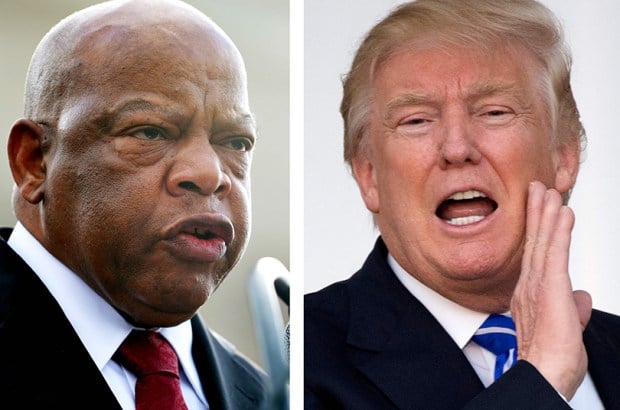The Washington, DC, police-chasing death of 20-year-old moped-riding African American youth by the name of Karon Hylton-Brown, through the streets and alleyways of the American capital, on October 29, 2020, occurred barely three months in the wake of the seismic and the epochal passing of firebrand Civil and Human Rights Activist Congressman John Lewis of Atlanta, Georgia. Still, it was the thought of this great American hero and moral and civically progressive leader and statesman that flashed across my mind in the wake of the issuance of an executive order pardoning the two police officers involved in the death of Mr. Hylton-Brown by President Donald John Trump, namely, Officer Terrence Sutton and Lt. Andrew Zabavsky (See “Pardons of DC Officers Leave City at Civil Rights Crossroads” Washington Post 1/23/25).
I thought about the immortalized Civil Rights Beacon because in the Ferguson, Missouri, shooting death of another African American male youth accused of shoplifting and the beating up of the grocery store owner that he had robbed, if memory serves Yours Truly accurately, Congressman Lewis characteristically forthrightly observed, during a lecture and a book-signing ceremony that was held in his honor at Nassau Community College of the State University of New York, where this author taught English language and Literature and Composition for some 26 years, that while human life was sacred and inviolable, in principle and morality, nevertheless, it was incumbent upon all parents, especially parents of the most politically vulnerable among the nation’s citizenry, to ensure that their children and grandchildren and relatives conducted themselves in ways that did not make it extremely difficult to defend the civil and the human rights of these most frequent victims of police brutality, whenever and wherever these inalienable democratic and constitutional rights appeared to have been either egregiously or flagrantly violated by law-enforcement agents and officers.
In the Michael Brown Case, in Ferguson Missouri, which touched off a nationwide firestorm of outrage and condemnation of police-related violence, the youngest major speaker at the Rev.-Dr. Martin Luther King, Jr-led 1963 March on Washington, DC, noted poignantly that the victim had absolutely no inalienable constitutional human or civil right to scandalously engage in the criminal act of shoplifting, although the police could have acted more responsibly by shooting to disable and not to kill the alleged criminal suspect.
In the Hylton-Brown Case as well, unfortunately, we witnessed a nearly identical axiological placement of the proverbial cart before the horse imagery, in the fact of a jury curiously voting to convict Officer Terrence Sutton and Lt. Andrew Zabavsky for “recklessly” chasing the victim, who had been forced to drive into a busy DC street and, as a direct result, gotten run over by a passing SUV.
In the latter case or incident, very likely, what irked the jury, at least going by the afore-referenced details of the news story right before this author on which this brief commentary and analysis are based, was the fact that the motorist of the SUV that fatally ran over Mr. Hylton-Brown had been allowed to drive away from the scene of this grisly accident almost immediately without any report of this fatal incident being duly and promptly made to the Major Crash Unit of the Washington, DC, Police Department, much less cordon off the crime scene in order enable detectives and investigators to collect evidence to ascertain what had really occurred, as a matter of standard procedure or protocol, as well as to determine whether any professional misconduct had occurred on the part of the police officers who had given Mr. Hylton-Brown the sort of wild chase – something that is officially advised against, for the most part – that resulted in the death of the target of arrest.
In effect, the conduct of Officers Sutton and Zabavsky was eerily and strikingly akin to a white-supremacist character in one of the classic and memorable picaresque stories of Mark Twain, in which the shooting death of an African American character is cavalierly chalked off as a “minor incident” or an act of patent inconsequence or inconsequentiality, pretty much like the alleged reportage of the incident of the wild-chase death of Mr. Hylton-Brown as a decidedly irrelevant, evanescent and a passing episode of absolutely no moment and as practically as significant as nonexistent.
Still, what makes the Hylton-Brown case especially bizarre and one that seriously threatens to thwart effective policing is by inferring that, somehow, a recklessly scooting Mr. Hylton-Brown ought to have been allowed to criminally ride roughshod over the rule of law and order, even while the allegedly wanted criminal suspect was also in the process of endangering more lives.
Equally paradoxically, however, Congressman Lewis would have been skeptical about the decision by President Trump to pardon Officers Sutton and Zabavsky. And all and primarily because a “faultfully” principled Congressman Lewis would have found the issuance of an Executive Pardon exonerating the January 6, 2021 Right-Wing Republican Party-sponsored coup-plotters on Capitol Hill to be diametrically antithetical to the core principles of American Democracy and the civilized rule of law and order.
By Kwame Okoampa-Ahoofe, Jr., PhD
Professor Emeritus, Department of English
SUNY-Nassau Community College
Garden City, New York
April 14, 2025
E-mail: [email protected]


